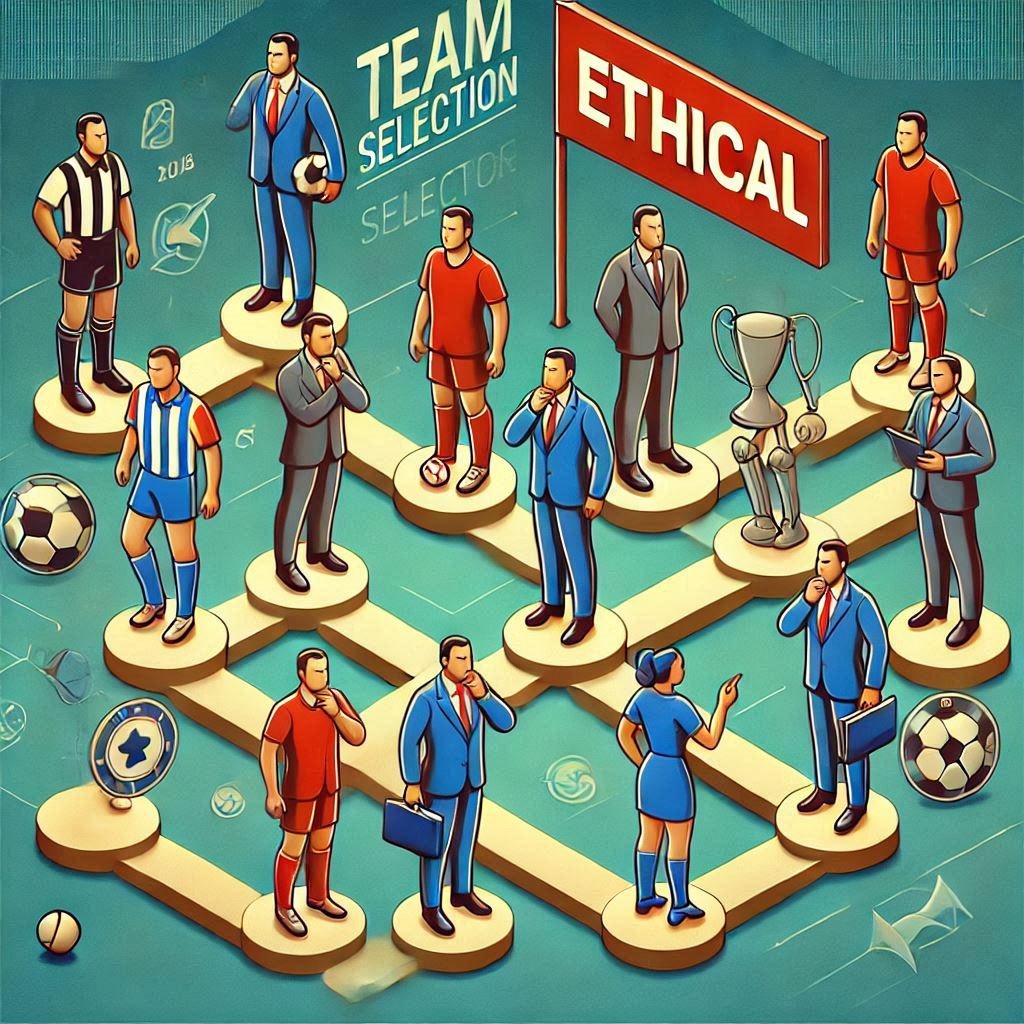Honest Team Selection Ethical Yet Rewarding Landscape
From Player To Selector For Team Selection… Awkward!!!!
Transitioning from a player to a selector within a sports team can be a rewarding yet challenging journey. This shift in role is not without its ethical dilemmas, as former players might face accusations of favoritism or comparisons to insider trading. Team selection is hard.
The Evolution from Player to Selector
The move from player to selector is often seen as a natural progression in the world of sports. Former players bring a wealth of experience, deep knowledge of the game, and an insider’s perspective on what it takes to succeed. This transition allows them to continue contributing to their teams in a new capacity, providing valuable insights that can enhance team performance.

The Issue of Favoritism
One of the primary concerns associated with this transition is the potential for favoritism. Former players may have strong personal connections with their ex-teammates, leading to biases in selection decisions. This favoritism can manifest in several ways, such as consistently selecting certain players despite their current form or overlooking more deserving candidates due to personal relationships.
Favoritism can erode team morale, as players may feel that selection decisions are based on relationships rather than merit. This undermines the principles of fairness and equity that are vital for maintaining a healthy team environment.

Comparisons to Insider Trading
The concept of insider trading involves individuals using privileged information to gain an unfair advantage in financial markets. While the role of a selector is not illegal, it can draw parallels to insider trading if former players use their intimate knowledge of team dynamics and individual performances to make biased decisions.
Selectors with inside knowledge might favor players with whom they have personal affinities, potentially leading to decisions that do not align with the best interests of the team. This can hinder the team’s progress and foster an environment of distrust among players and staff.

Why Does This Happen Frequently in Sports?
The phenomenon of favoritism and potential bias is prevalent in sports for several reasons
Close Relationships
Sports teams often form tight-knit communities where players and coaches develop strong bonds. These relationships can lead to unconscious biases when former players transition to selector roles.

Nostalgia and Loyalty
Former players may have fond memories and a sense of loyalty towards their ex-teammates. This nostalgia can influence their decision-making, causing them to favor familiar faces over potentially more qualified candidates.
Pressure and Expectations
Selectors may face pressure from various stakeholders, including fans, sponsors, and management, to include certain players in the team. This external pressure can affect their objectivity.

Lack of Clear Guidelines
In some organizations, the criteria for selection may not be well-defined or transparent. This lack of clarity can lead to decisions based on personal preferences rather than merit.
Should It Be Allowed?
Whether former players should be allowed to become selectors is a nuanced question. On the one hand, their experience and insights can be invaluable. They understand the pressures of the game and can provide support and guidance that only someone who has been in their shoes can offer.
On the other hand, the risk of bias and favoritism cannot be ignored. To maintain the integrity of the selection process, it is crucial to implement measures that ensure impartiality and fairness.

Implementing Safeguards
To mitigate the risks associated with this transition, several safeguards can be put in place.
Transparent Selection Criteria
Establishing clear and objective criteria for team selection can help ensure decisions are based on merit rather than personal relationships. transperancy is key and any decisions should be communicated openly to all stakeholders.

Regular Audits
Conducting regular audits of the selection process can help maintain accountability and transparency. This ensures that all decisions are reviewed and justified based on the established criteria.
Training for Selectors
Providing training on ethical decision-making and conflict of interest policies can help former players understand the importance of impartiality and how to navigate potential biases.
Independent Oversight
Involving an independent panel in the selection process can provide an additional layer of scrutiny and help prevent favoritism. This panel can review and approve selections to ensure fairness.

Case Studies and Examples
Several sports organizations around the world have successfully implemented these safeguards to maintain the integrity of their selection processes. For instance, Cricket Australia has a rigorous selection process that includes clear criteria and oversight by an independent panel. Similarly, the English Football Association has established transparent guidelines and regular audits to ensure fairness in team selections.
The Case of Cricket Australia
Cricket Australia provides a pertinent example of the complexities involved in the player-to-selector transition. The selection process in Australian cricket has often been scrutinized for potential biases and the influence of former players. The higher profile you are the more people look and see things they want to see.
Lineage and Legacy
Cricket Australia has a history of selecting players based on lineage and legacy, sometimes prioritizing individuals with family connections or long-standing ties to the cricketing community. This practice has led to criticisms, especially when such players are not in the best form or when more deserving candidates are overlooked.
High-Profile Criticism
The Australian cricket selection process has faced high-profile criticism from former players, analysts, and fans. Instances where players with subpar performance records continue to be selected raise questions about the transparency and fairness of the process.

Performance vs. Reputation
Selectors in Australian cricket have sometimes been accused of favoring established players based on their reputation rather than their current form. This can create a scenario where younger, in-form players struggle to break into the team, affecting the team’s overall competitiveness.
Reflections on the Transition
The journey from player to selector is undoubtedly filled with challenges, but with the right measures in place, former players can make valuable contributions to their teams. It is essential to balance the benefits of their experience with the need for impartiality and fairness in the selection process.
By fostering a culture of transparency and accountability, sports teams can navigate the ethical complexities of this transition and ensure that all selection decisions are made in the best interests of the team as a whole.
Conclusion
The transition from player to selector carries inherent risks of favoritism and bias, yet it should not be outright prohibited even though this is easy to say. With appropriate safeguards and a commitment to transparency, former players can provide unique insights and contribute meaningfully to their teams and team selection. Ensuring fairness and meritocracy in the selection process is crucial to maintaining team integrity and fostering a positive environment for all players.
Join the Discussion
Do you believe former players transitioning to selectors pose a significant risk of favoritism or how you look at team selection? How do you think sports organizations can best ensure fairness in the selection process?
Have you witnessed or experienced bias in team selections? What safeguards do you think are most effective in maintaining impartiality in team selection? How would you balance team selection?






Hey There. I discovered your weblog the usage of msn. That is an extremely neatly written article. I’ll make sure to bookmark it and return to read more of your helpful info. Thanks for the post. I will certainly return.
Pretty great post. I simply stumbled upon your blog and wished to mention that I have really enjoyed surfing around your weblog posts. After all I’ll be subscribing on your rss feed and I am hoping you write again soon!